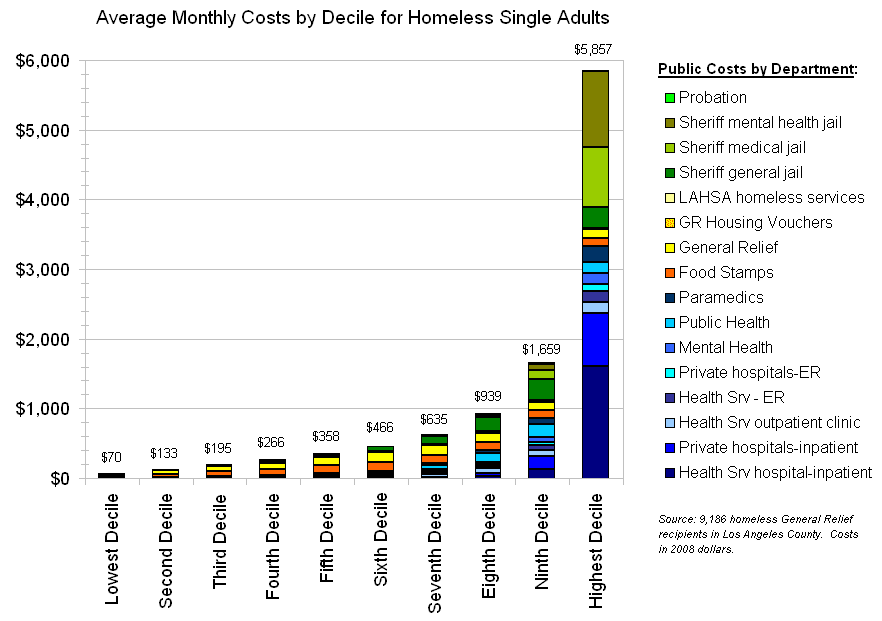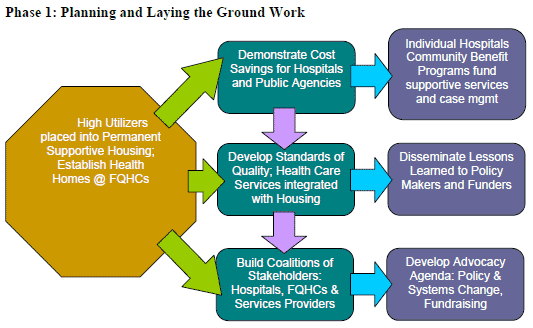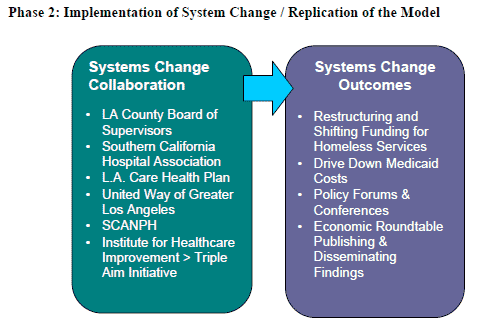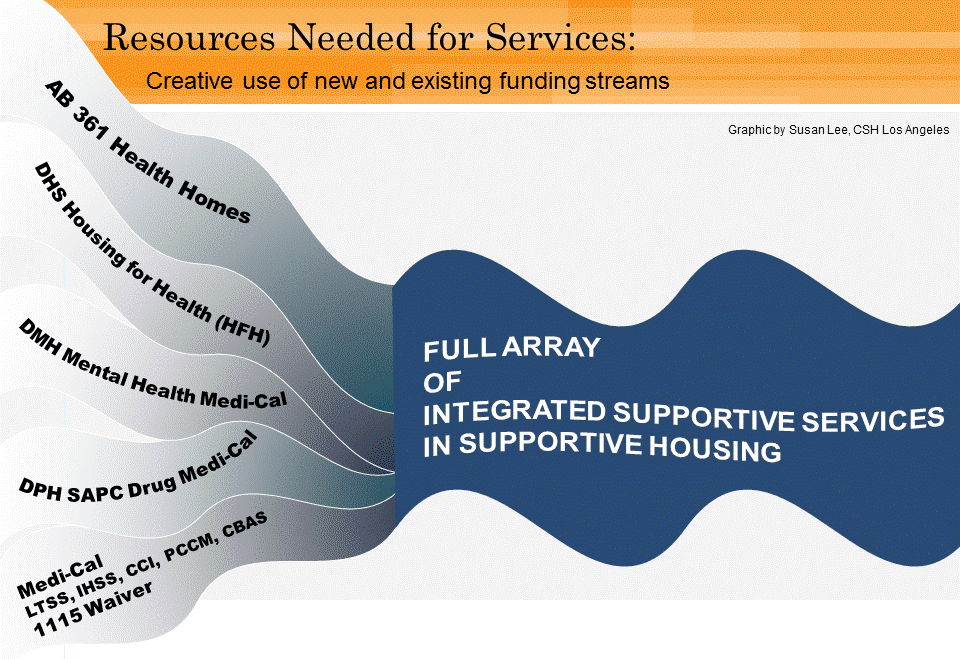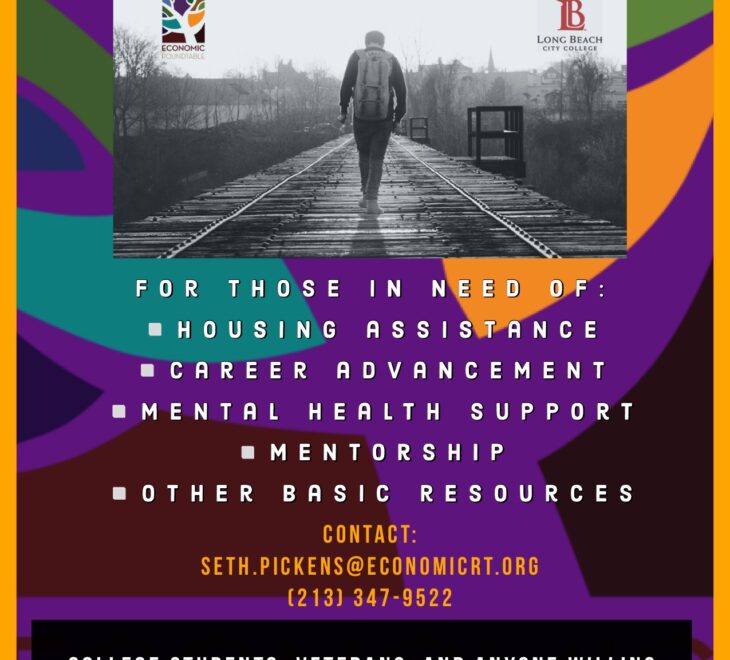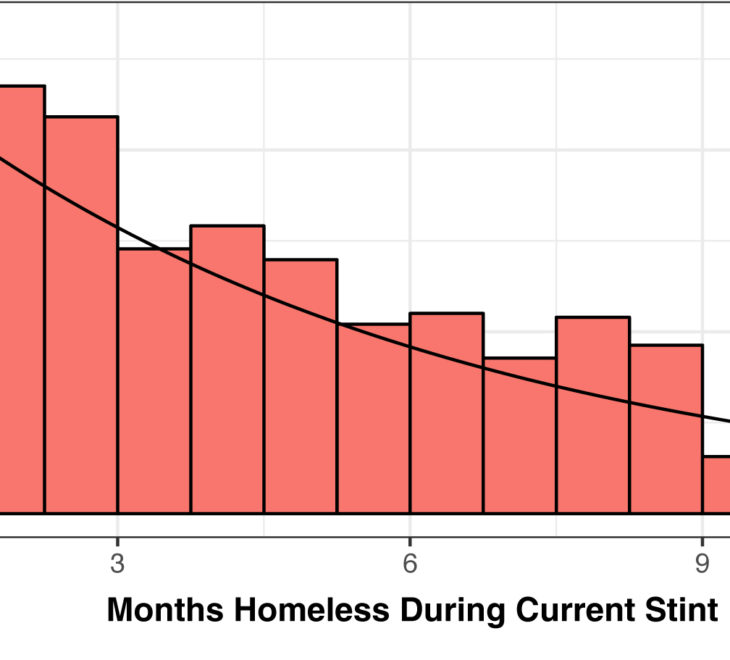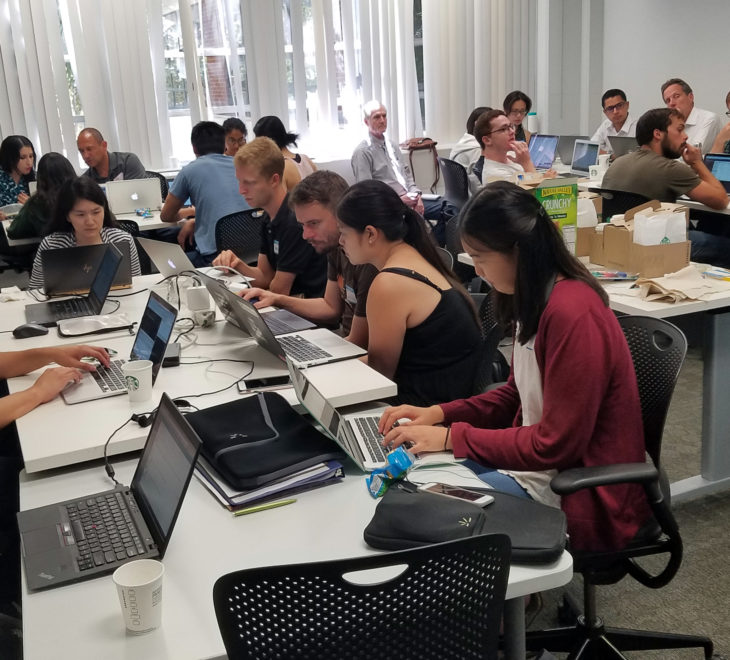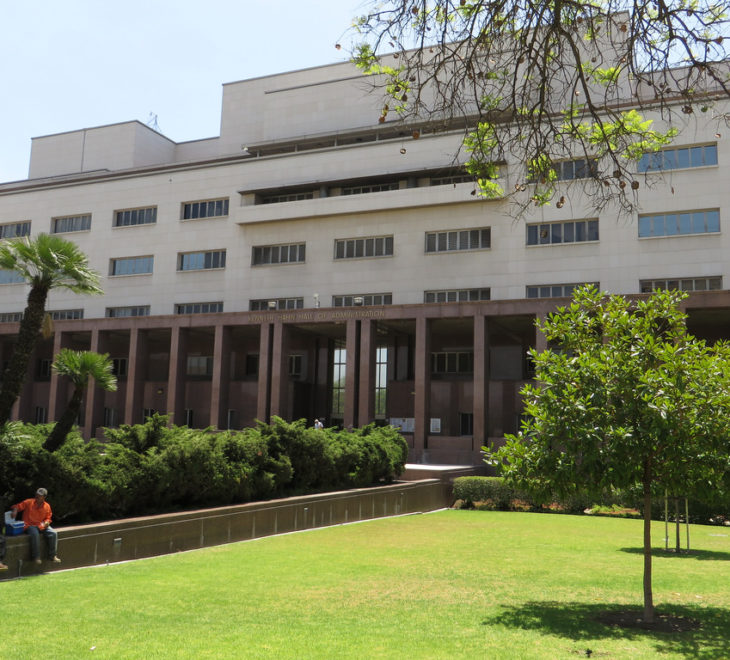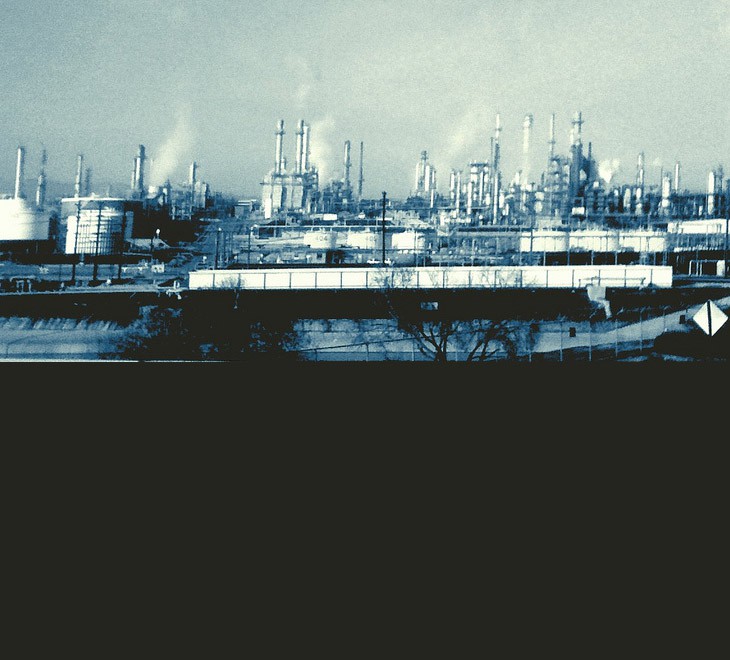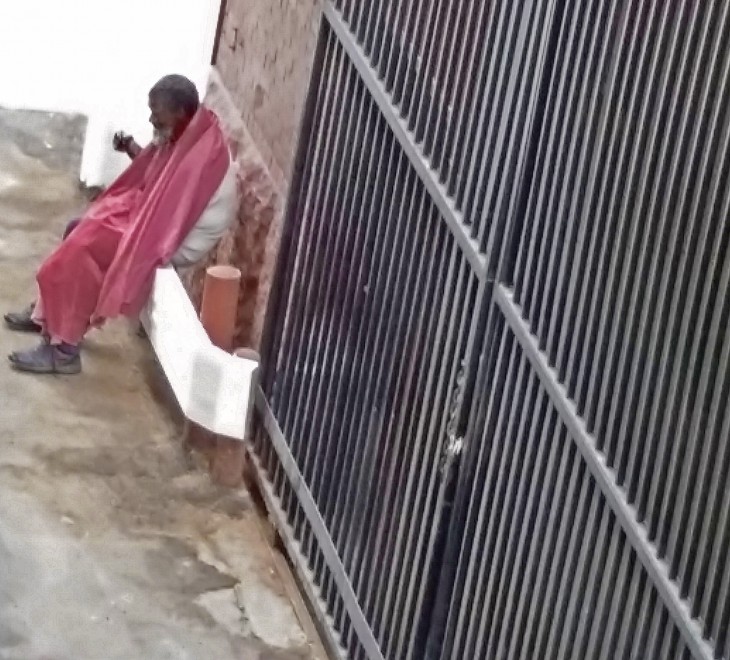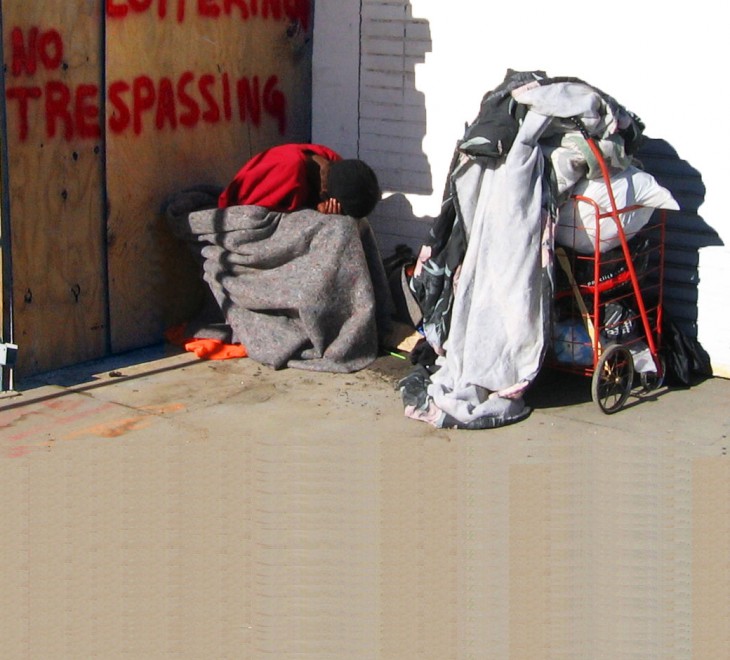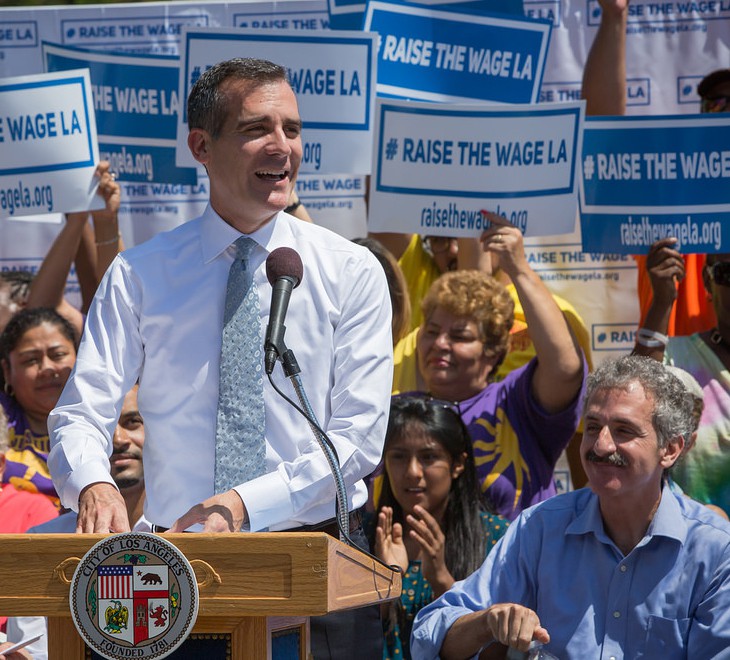10th Decile Project to House High Need Homeless
Social Innovation Fund (SIF) Grant Awarded to the Economic Roundtable Team, 2012-2015
News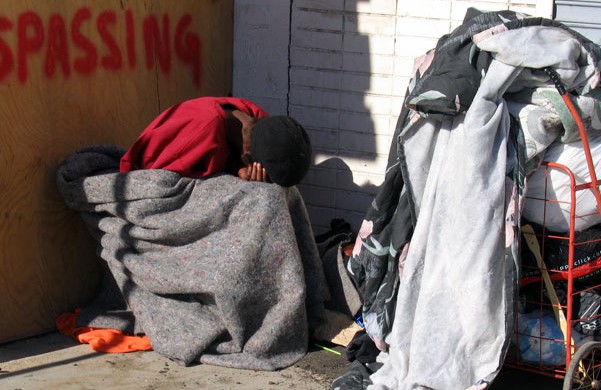
The Economic Roundtable Team was one of four groups working on homelessness selected from across the U.S. to receive a national Social Innovation Fund grant underwritten by the Corporation for National and Community Service. The grant was awarded through our intermediary, the Corporation for Supportive Housing (CSH) as part of its SIF Intitiative taking place in Los Angeles, San Francisco, Washtenaw County, Michigan and statewide in Connecticut. The Roundtable team of five key partners and a total of 38 hospitals, clinics, housing providers, and homeless service providers is identifying 107 high-need, high-cost homeless individuals in hospitals and clinics and providing them with immediate, ongoing, affordable housing with services. This project builds on Economic Roundtable research, a pilot project initiated in partnership with CSH, and service delivery teams created by CSH’s Los Angeles office.
The 10th Decile Project uses the triage tool (free download) developed by the Economic Roundtable to identify individuals experiencing homelessness who continuing crises in their lives that create very high public costs. The Roundtable research that led to developing the triage tool is presented in Where We Sleep: The Costs of Housing and Homelessness in Los Angeles (2009) and Crisis Indicator: Triage Tool for Identifying Homeless Adults in Crisis (2011). This is the only tool for prioritizing the needs of homeless individuals that is based on cost data for a generally representative sample of homeless persons.
Program Description
The project team included the foremost organizations leading and implementing humane, evidence based initiatives to end chronic homelessness in Los Angeles County. The five key partners are Housing Works, Homeless Health Care Los Angeles, OPCC (formerly Ocean Park Community Center), PATH (People Assisting the Homeless), and Ascencia (formerly PATH Achieve Glendale). The Economic Roundtable brings strengths for developing and improving evidence-based tools for identifying homeless individuals with acute needs and high public costs, and for analyzing and using data to inform program decisions.
The project team moved 107 high-need, high-cost homeless individuals into permanent supportive housing using the triage screening tool developed by the Roundtable. These are frequent users of emergency health services and inpatient hospital care who, in the absence of ongoing case management and permanent affordable housing, will have ongoing health crises and be frequent user of emergency health services.
All team members are using a “whatever it takes” approach to reach and retain the individual. The overall goal is to provide patient-centered health homes with fully integrated comprehensive health, mental health and substance use and housing treatment, with a seamless, no-wrong-door, non-linear, holistic, client-driven model that incorporates an ongoing array of opportunities to achieve overall health and wellbeing. The result is improved housing stability and health, and reduced use of emergency health services.
This project is supported by the elected leadership and health and housing agencies of the city and county of Los Angeles and neighboring cities. This support and the size and competence of the project team position this 10th Decile Project to achieve systemic change for addressing homelessness.
The participating hospitals treat over 4,000 homeless inpatients and 9,000 homeless emergency room patients each year. Each hospital will receive training and technical assistance from the Economic Roundtable in using the triage tool and will use the tool to identify high-need homeless individuals, who will be handed off to the team’s intensive case management and housing placement/retention service providers.
The participating Federally Qualified Community Health Centers (FQHCs) are partners for providing primary care and patient-centered medical homes for participants. Each FQHC has extensive experience and strong capabilities for providing high need individuals who have experienced homelessness with a system of coordinated care that integrates primary care, behavioral health, and other social services to care for all aspects of their patients’ health. Each FQHC will also receive training and assistance from the Economic Roundtable in using the triage tool and will collaborate in screening and identifying high-need individuals for enrollment in the project.
The participating permanent supportive housing organizations provide ongoing housing with supportive services. Each organization is committed to a housing first approach, allowing each individual to create the home and community that best allows him/her to build a rich and meaningful life. The housing providers collaborate with the team’s intensive case management and housing placement/retention service providers to identify available permanent supportive housing units and lease those units to participants.
10th Decile Project Triage Tool
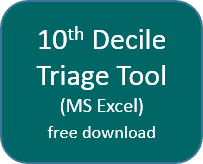 The triage tool (free download) was developed based on two key propositions:
The triage tool (free download) was developed based on two key propositions:
- The greatest risk to homeless individuals is of continuing crises in their lives, particularly crises that cause encounters with hospitals and jails.
- The most compelling basis for prioritizing access of homeless individuals to the scarce supply of permanently subsidized supportive housing is the public costs that will be avoided when they are housed.
The triage tool was developed by the Economic Roundtable’s statistician, Jay Sumner. It is a system-based tool for identifying the one-tenth of homeless persons with the highest public costs, and the acute ongoing crises that create those high costs. This 10th decile is the highest need segment of a much larger homeless population needing housing.
This tool equips gatekeeper institutions such as hospitals and clinics to identify accurately individuals experiencing homelessness whose acute needs create the greatest public costs, and to make credible requests to housing providers that these individuals be given first priority for the scarce supply of permanently affordable housing with supportive services.
When people in the 10th decile are living in permanent supportive housing, jail costs decrease 97 percent and health care costs decrease 86 percent. These cost savings are contingent on retaining people in permanent supportive housing, which is facilitated by higher rather than lower levels of on-site services, particularly given the severe problems of many individuals in the 10th decile.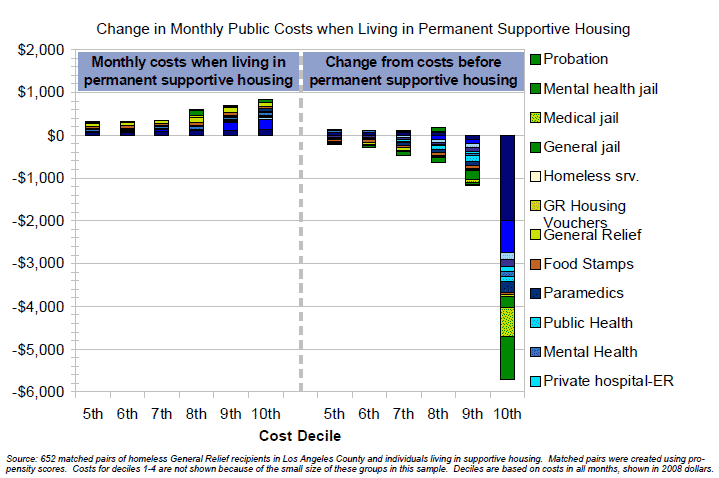
The Economic Roundtable is the 10th Decile Project lead and is facilitating team collaboration and communication, as well as providing training, technical support and hands-on assistance in using the triage tool to identify high-need individuals who get enrolled in the project.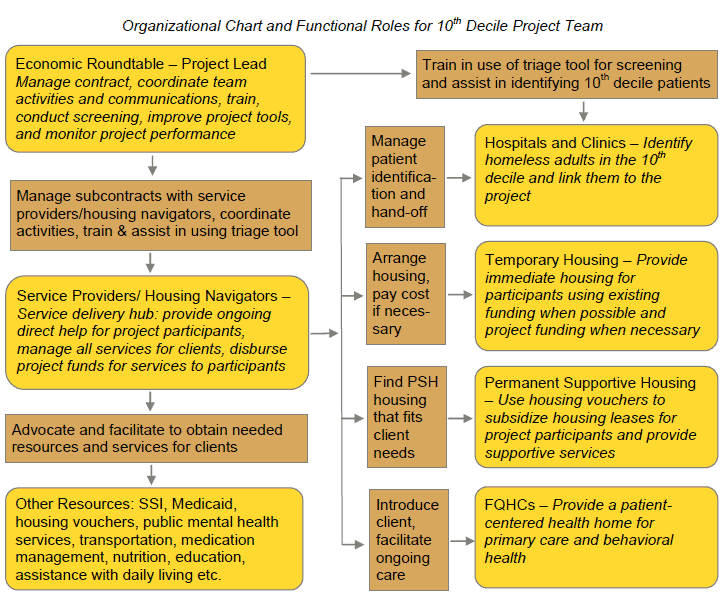
The team’s intensive case management and housing placement/retention service providers are the service delivery managers for this project. They maintain long-term, high-touch contact with participants, starting with immediate temporary housing (in a shelter or motel) , connection with a FQHC, placement in permanent supportive housing, and continuing throughout the duration of the project. All five are committed to using housing first and harm reduction service delivery models for high-need individuals experiencing homelessness. They are responsible for the delivery of all needed client services. This begins with assertive outreach in clinics and hospitals to recruit members of the target population and continue with care management and service coordination. They engage and case manage clients, empowering them to identify and define their own service goals and needs, and help them connect to needed health, behavioral health, vocational/educational, transportation, medication, management, nutrition education, assistance with daily living, and other services.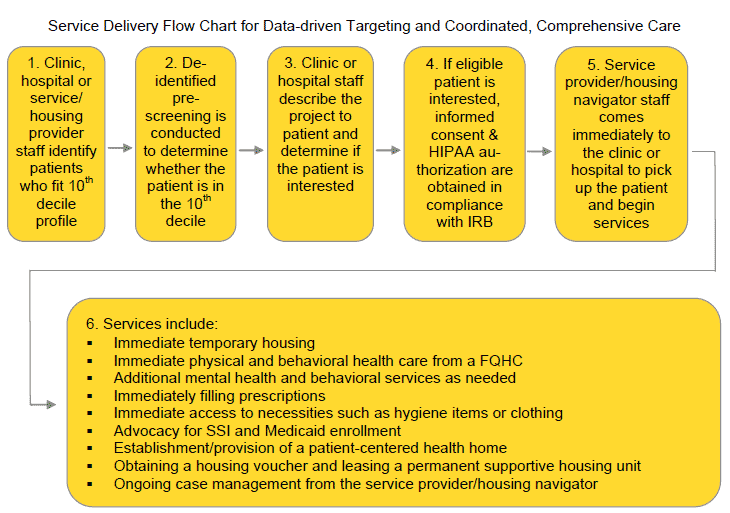
Hospital and clinic patient records are used to identify high cost users of crisis health care services to target high-need homeless patients for outreach and enrollment. At le ast 24 of the organizations on the project team will be trained in using the triage tool and will participate in outreach and screening. This includes all intensive case managers, housing placement/retention staff, hospitals and medical clinics on the team. In the early stages of the project, Roundtable staff has been working on-site with agency staff to assist in screening. As agency staff become more experienced and confident in using the screening tool, the Roundtable has shifted into a role of providing technical support and backup assistance.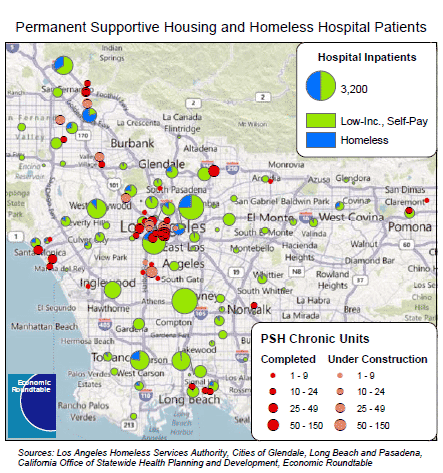
Background
The 10th Decile Project builds on the service delivery network and experience from the Los Angeles FUSE (Frequent User Systems Engagement) Project piloted by CSH’s Los Angeles office and the Economic Roundtable, in collaboration with Housing Works and OPCC, as well as Homeless Health Care Los Angeles. This 10th Decile Project is expanding these pilot programs by adding 2 service provider teams, 11 hospitals, 3 FQHC health care providers, and 5 interim and 6 permanent housing partners. The project is enrolling eligible individuals in downtown Los Angeles, West Los Angeles/Santa Monica, the southeast San Fernando Valley, Whittier, Glendale, Pasadena and the San Gabriel Valley, Hollywood, East Los Angeles, and South Los Angeles.
Theory of Change
The Economic Roundtable Team expects to achieve systems change and replication of our 10th Decile Project model at the regional level and beyond, building financial sustainability for a new approach to screening referring and housing homeless adults. The model consists of a triage tool, methods, strategy and outcomes that affect a variety of stakeholders, including service providers, FQHCs, hospitals and local government.
This project is demonstrating the long-term cost savings for hospitals and public agencies from screening using the triage tool, and demonstrating why the public sector and health care providers should invest to support this screening, referral and permanent supportive housing model.
This project also demonstrates a new model for helping the highest need homeless adults get priority access to permanent support housing with intensive case management, while reducing costs for public agencies and private health care providers. Larger scale success of this model in Los Angeles County will be a springboard for broader implementation across the country, with the broader involvement of policy makers, the private sector and philanthropy.
Knowledge Network
For team members, enter CSH’s national-level discussion forum and document hosting web site:
About the Social Innovation Fund (SIF)
Scaling and Sustainability
During year 3 of this SIF-funded 10th Decile Project, the Los Angeles SIF team is focused on housing retention for existing clients, and operationalizing our plan for scaling and sustainability. More information about the LA SIF team’s scaling and sustainability plan will be posted here soon:
Links for scaling and sustainability:
- Social Impact Exchange “2014 Conference on Scaling Impact” New York City, June 18 – 19, 2014.
Library
Research by the Economic Roundtable produced the data-driven tools that will be used in this project to identify the highest-need group of individuals experiencing homelessness. These reports can be accessed below:
- Getting Home: Outcomes from Housing High Cost Homeless Hospital Patients. September 2013. This evaluation of outcomes for the first 163 patients screened with the triage tools found that every $1 dollar in local funds spent to house and support 10th decile patients reduces public and hospital costs for individuals who are housed by $2 in the first year and $6 in subsequent years. The most difficult problem is long delays in obtaining permanent supportive housing. Underwritten by the Conrad N. Hilton Foundation, UniHealth Foundation, the Corporation for National and Community Service, the Corporation for Supportive Housing, and the Economic Roundtable.
- Crisis Indicator: Triage Tool for Identifying Homeless Adults in Crisis. August 2011. The triage tool, or crisis indicator, identifies homeless individuals in hospitals and jails who have continuing crises in their lives that create very high public costs. The triage tool for identifying high-need individuals is provided along with the report. Underwritten by the Corporation for Supportive Housing and the Conrad N. Hilton Foundation.
- Where We Sleep: The Costs of Housing and Homelessness in Los Angeles. November 2009. The central question investigated in this study is the public costs for people in supportive housing compared to similar people that are homeless. The typical public cost for residents in supportive housing is $605 a month. The typical public cost for similar homeless persons is $2,897, five-times greater than their counterparts that are housed. This remarkable finding demonstrates that practical, tangible public benefits result from providing supportive housing for vulnerable homeless individuals. The stabilizing effect of housing plus supportive care is demonstrated by a 79 percent reduction in public costs for these residents. Prepared for the Los Angeles Homeless Services Authority.
Articles and related reports by others:
- Los Angeles Downtown News “County Looks to Set Aside $100 Million Annually for Affordable Housing” Los Angeles Downtown News, October 27, 2015.
- Grad, Shelby and Gale Holland “How Los Angeles’ homeless crisis got so bad” Los Angeles Times, September 22, 2015.
- Curbed Staff “Los Angeles Producing Just a Fifth of the Homeless Housing it Needs Every Year” Curbed LA, September 10, 2015.
- Emily Badger “It’s unconstitutional to ban the homeless from sleeping outside, the federal government says” Washington Post, August 13, 2015.
- Sarah Parvini And Martha Groves “Boxer, Feinstein back plan to move homeless vets to VA campus” Los Angeles Times, August 6, 2015.
- Grynbaum, Michael M. and Nikita Stewart “De Blasio Takes On Homelessness With $22 Million Initiative” New York Times, August 5, 2015.
- Los Angeles Downtown News “Homeless Program Offers to Clear Citations, Fines” Los Angeles Downtown News, August 4, 2015.
- Dakota Smith “Los Angeles Mayor Eric Garcetti declares ‘war on homelessness’” , Los Angeles Daily News, July 30, 2015.
- Holland, Gale “Belongings: Home the Homeless Live and What They Keep” Los Angeles Times, August 6, 2015. June 16, 2015.
- Smith, Doug and Jon Schleuss “Where are L.A. County’s homeless?” (Interactive data maps from the Los Angeles Homeless Services Authority’s 2015 homeless enumeration) Los Angeles Times, June 4, 2015.
- Smith, Doug “L.A. County has its most accurate count yet of its homeless population” Los Angeles Times, June 4, 2015.
- H. Joanna Jiang, Ph.D., Audrey J. Weiss, Ph.D., Marguerite L. Barrett, M.S., and Minya Sheng, M.S. “Characteristics of Hospital Stays for Super-Utilizers by Payer, 2012 #190” Healthcare Cost and Utilization Project (HCUP), May 2015.
- Barkermay, Kim “A Choice for Recovering Addicts: Relapse or Homelessness” New York Times, May 30, 2015.
- Tyler, Jeff “Making a home without a house (part 2 of 2)” Marketplace, May 29, 2015.
- Tyler, Jeff “In Los Angeles, homeless camps are suddenly everywhere (part 1 of 2)” Marketplace, May 28, 2015.
- Marketplace staff “Video: Homeless in LA” Marketplace, May 28, 2015 – 15:29
- Roberts, Joel John “Homelessness in Los Angeles: Down For the Count?” Poverty Insights, May 13, 2015.
- Editorial Board “Homeless and living in a car: What rules should L.A. apply?” Los Angeles Times, May 12, 2015.
- Holland, Gale “L.A. files suit accusing Hawaiian Gardens hospital of patient dumping” Los Angeles Times, April 28, 2015.
- Holland, Gale “L.A. City Council calls for new plan to get homeless off the streets” Los Angeles Times, April 22, 2015.
- Opinion Letters to the Editor: Homelessness “We can’t fight homelessness without providing homes” Los Angeles Times, April 20, 2015.
- Holland, Gale “Why most of the $100 million L.A. spends on homelessness goes to police” Los Angeles Times, April 17, 2015.
- Center for Health Care Strategies “Digital Health Developer Challenge Targets Low-Income, High-Need, High-Cost Population” April 15, 2015.
- Florido, Adrian “A new shelter in East LA provides sanctuary for homeless women” 89.3 KPCC News, March 31, 2015.
- Lopez, Steve “10 years later, L.A.’s skid row remains an urban dystopia” Los Angeles Times, March 3, 2015.
- Insure The Uninsured Project (ITUP). Funded in part by The California Wellness Foundation.
- Los Angeles County. 2015. “Vision of an Integrated Health Agency,” “Health Integration Motion by the Los Angeles County Board of Supervisors“
- Holland, Gale “Skid row doctor’s care includes finding patients a home” Los Angeles Times, January 14, 2015.
- Weinberg, David “Cutting health costs by subsidizing housing” Marketplace, December 15, 2014.
- Holland, Gale “Hidden homeless make do in the shadows of downtown L.A.’s luxury
Hidden homeless” Los Angeles Times, December 14, 2014. - Zassenhaus, Eric “How close is LA to ending veteran homelessness?” KPCC News, November 12, 2014.
- Hillard, Gloria “Communities Struggle To Reach Homeless Students Living In The Shadows” National Public Radio, November 11, 2014.
- Abram, Susan. “San Fernando Valley to open homeless patient recuperative care center” Los Angeles Daily News, November 8, 2014.
- Dreisbach, Tom and Arun Rath “As Downtown LA Grows, So Does Urgency To Fix Skid Row” National Public Radio, October 26, 2014.
- Evans, Donna “The Man on the Front Lines Against Skid Row Dumping” Los Angeles Downtown News, October 20, 2014
- Holland, Gale “Skid row groups are divided over future of homeless district” Los Angeles Times, September 30, 2014.
- Surowiecki, James. “Home Free? Give the Homeless Homes” New Yorker Magazine, September 22, 2014.
- (Press Release) “The Affordable Care Act supports patient-centered medical homes in health centers Obama administration awards over $35 million to support facility improvements in 147 health centers nationwide to deliver better coordinated care” U.S. Department of Health & Human, August 26, 2014.
- Holland, Gale “Homeless people migrating from downtown to County-USC, study finds Homeless people leaving downtown L.A. for County-USC” Los Angeles Times, August 21, 2014.
- “Report Finds Domestic Violence, Lack of Housing for Skid Row Women” Los Angeles Downtown News, August 7, 2014.
- “Feinstein, Boxer, Waxman Urge White House to Request Housing for Homeless Los Angeles Veterans in FY16 Budget” Real Estate Rama, August 1, 2014.
- Aron, Hillel “L.A.’s Culture War Over the Last True Skid Row in America” LA Weekly, July 24, 2014.
- Landen, Xander “More cities across the U.S. consider homelessness a crime” PBS/NewsHour/The Rundown blog, July 19, 2014.
- Fessler, Pam “With A Series Of Small Bans, Cities Turn Homelessness Into A Crime” National Public Radio, July 16, 2014.
- Holland, Gale. “L.A. leaders are crafting new plan to help homeless on skid row” Los Angeles Times, July 15, 2014.
- Real Change Movement. “Video Interview with Housing Works Mobile Integrated Services Team case worker Shawn Morrissey” (YouTube, length 3:29) July 11, 2014.
- Real Change Movement. “Video Interview with Economic Roundtable President Dan Flaming” (YouTube, length 2:22) July 11, 2014.
- Joseph, Deon “Skid Row Cop: Downtown Is in a Mental Health State of Emergency” Los Angeles Downtown News, June 30, 2014.
- Evans, Donna. “Valley Hospital to Pay $500,000 to Settle Skid Row Dumping Case.” Los Angeles Downtown News, May 30, 2014.
- Kimble, Julian. “A Homeless Grandmother Has Been Arrested More Than Anyone Else in Los Angeles Over Past Six Years.” Complex. April 29, 2014.
- O’Farrell, Mitch. “Taking steps to ease affordable housing crisis in Los Angeles.” Los Angeles Daily News. April 28, 2014.
- Burns, Patrick. “High Utilizers 101: 10th Decile Project Overview” presentation video (24 mins.) from the LA Community Health Project’s ACA: New Models for Working with Drug Users sympsium, held April 21, 2014 at The California Endowment.
- Barragan, Bianca. Feel-Good Prank Turns Homeless Shelter (Ascencia) Into Fancy Restaurant. Curbed Los Angeles blog. April 1, 2014.
- Doran, Kelly M. and Roberta Capp. Trading Hospital Doors for Front Doors: Hospital “Super Use” by People Experiencing Homelessness and the Role of Supportive Housing. US Interagency Council on Homelessness blog. March 25, 2014.
- Mann, Cindy. Reducing Nonurgent Use of Emergency Departments and Improving Appropriate Care in Appropriate Settings (CMCS Informational Bulletin). US Department of Health and Human Services, Centers for Medicare & Medicaid Services. January 16, 2014.
- Nolan, Hamilton. “How Cities Are Eradicating Homelessness Among Veterans” Associated Press (via Gawker), January 16, 2014.
- Ramage, Megan “Southern California Pilot Testing Hospital-Based Navigators For High-Cost Homeless Consumers” Open Minds. December 27, 2013.
- AP PHOTOS: [Los Angeles’] Skid Row, home to thousands of homeless people, a battleground of misery and hope, by Jae C. Hong, Associated Press, October 24, 2013.
- Los Angeles City Attorney investigating new cases of possible Skid Row ‘patient dumping,’ by Hayley Fox, KPCC Public Radio, October 8th, 2013
- Fleischer, Matthew. “A Place to Call Home: The tireless efforts of Project Housed are breaking the city’s cycle of homelessness” Pasadena Monthly, October 2013. Photographs by Jessica Chou.
- Capp R., Rosenthal MS, Desai MM, Kelley L, Borgstrom C, Cobbs-Lomax DL, Simonette P, Spatz ES. 2013. Characteristics of Medicaid enrollees with frequent ED use. American Journal of Emergency Medicine 31(9). September, pages 1333-7.
- Experts seek better health outcomes for homeless. June 2013. “Hospital administrators, lawyers, doctors and providers of homeless services explore ways to use technology, outpatient clinics and other means to reduce patient dumping, readmissions.” by Anna Gorman, Los Angeles Times.
- Doran, Kelly M., Maria C. Raven, Robert A. Rosenheck. What Drives Frequent Emergency Department Use in an Integrated Health System? National Data From the Veterans Health Administration. Annals of Emergency Medicine. April 11, 2013.
- Ideas to Impact: A Tool that Places Homeless Individuals in Supportive Housing. April 2013. A success story from the Los Angeles 10th Decile Project, a SIF-funded collaborative with the Corporation for Supportive Housing.
- CSH Social Innovation Fund: Funding Solutions in Supportive Housing and Health Care. 2012. “CSH is leading a five-year national initiative to create innovative solutions at the intersection of supportive housing and healthcare. Our goal is to address the growing U.S. problem of rising health care costs by demonstrating a supportive housing solution that pulls people with the most complex issues out of the revolving door of costly crisis health services.”
- The Social Innovation Fund is an initiative of the Corporation for National and Community Service (CNCS) intended to improve the lives of people in low-income communities. It does so by mobilizing public and private resources to grow promising, innovative community-based solutions that have evidence of compelling impact in three areas of priority need: economic opportunity, healthy futures, and youth development.is a federal agency that engages more than five million Americans in service through Senior Corps, AmeriCorps, and Learn and Serve America, and leads President Obama’s national call to service initiative, United We Serve.
- Residential therapy Hospitals take on finding housing for homeless patients, hoping to reduce readmissions, lower costs. September 2012. Review of recent efforts by hospitals to discharge their patients into permanent supportive housing, with examples of partnerships drawn from the 2012 CSH Social Innovation Fund subgrantees. Article by Melanie Evans, posted on Modern Healthcare.com (subscription required).
- McBoyle, Krissy “Doctor’s Orders: New Program for the Homeless Pairs Healing with Housing” Venice Family Clinic. August 2010.
- Time and Again: Frequent Users of Emergency Department Services in New York City examines patterns of emergency department use in New York City at an individual level. “This new report on New York City’s Chronic Illness Demonstration Program (CIDP), which was a care management pilot focused on the highest users of emergency rooms and hospitals in New York City. The program used a predictive algorithm similar to the Economic Roundtable’s triage tool to identify high utilizers.”
- Homelessness: Programs and the People They Serve was released by the US Department of Housing and Urban Development in 1999, and is based upon the 1996 National Survey of Homeless Assistance Providers and Clients. “It was designed to provide updated information about the providers of homeless assistance and the characteristics of homeless persons who use services. The survey is based on a statistical sample of 76 metropolitan and non-metropolitan areas, including small cities and rural areas. Data for the survey were collected between October 1995 and November 1996.”(112 pages)
- The Almanac of Family Homelessness, released by the Institute for Children, Poverty, and Homelessness (ICPH), provides a “comprehensive state-by-state analysis on family homelessness statistics, policies, and programming” in the US.

